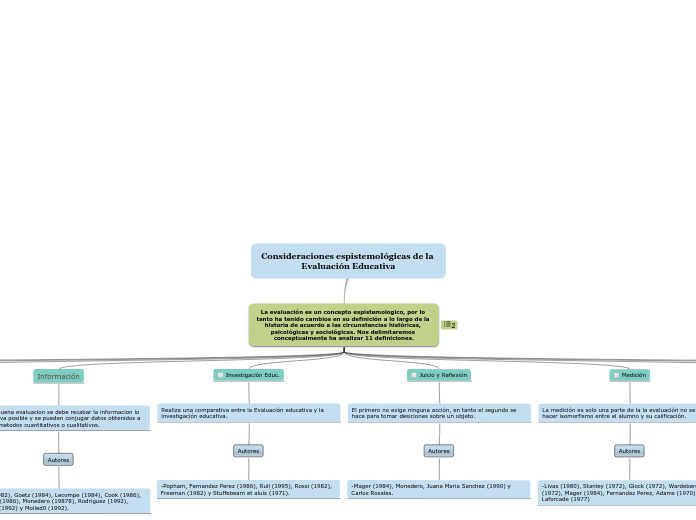av CLaudia Ivette Cervantes för 5 årar sedan
315
Consideraciones espistemológicas de la Evaluación Educativa

av CLaudia Ivette Cervantes för 5 årar sedan
315

Mer av detta
Type in the name of the multiple-perspectives text.
Example: Bridge to Terabithia by Katherine Paterson
Identify an important issue from the text that is being presented from different angles. Type it in.
Example: Jesse's drawing talent.
-Sarup
Pirsing R.M., Popham, Carreño, Livas, Cesar Coll, Fernandez Perez, Pidgeon, Yates, Farre, Goll, Taba, Shavelson y Carreño.
-Perenoud, Taba, Pieron, Hoyat, Pidgeon, Yates, Lopez, Llopis et alius, Spears, Cardinet, Fernandez Perez, Madaus, Kellaghan, Enis, Fuertes, Worthen, Alonso, Gil y Martinez.
-Wheelwr (1979), Rull, Michael Scriven (1983)
-Livas (1980), Stanley (1972), Glock (1972), Wardeberg (1972), Mager (1984), Fernandez Perez, Adams (1970) y Laforcade (1977)
-Mager (1984), Monedero, Juana Maria Sanchez (1990) y Carlos Rosales.
-Popham, Fernandez Perez (1986), Rull (1995), Rossi (1982), Freeman (1982) y Stuffebeam et aluis (1971).
Decide on the fourth point of view
Type in the name of the last character whose perspective on the issue you are going to present.
Example: Leslie Burke, Jesse's new next-door neighbor, and best friend.
Point of view
Type in a relevant quote that highlights the character's point of view. Try to follow a citation format: author's name, chapter, and page.
Example: I can't get the poetry of the trees,' he said. She nodded. Don't worry,' she said. You will someday. He believed her.' (Paterson, 4. 24)
How is the viewpoint introduced in the story?
Choose an answer:
-Alvira (1982), Goetz (1984), Lecompe (1984), Cook (1986), REichardt (1986), Monedero (19878), Rodriguez (1992), Gutierrez (1992) y Molled0 (1992).
Whose character does the third point of view belong to?
Type in his/her name.
Example: Mr. Aarons, Jesse's father.
What does the character think, say or do that suggests their perspective on the issue?
Type in a quote and try to maintain the citation format.
Example: 'He would like to show his drawings to his dad, but he didn't dare. (...) He'd thought his dad would be pleased. He wasn't. What are they teaching in that damn school? he had asked.' (Paterson, 2.8)
What kind of narration introduces the viewpoint?
Choose an answer:
- Norris (1992), Elliott (1992), Alvaro Page(1992), Izquierdo (1992), Tiana (1994) y Serrano et alius (1995)
Decide on the second point of view
Name the character (it can either be the main character or one of the supporting characters) whose point of view you are presenting.
Example: Miss Edmunds, Jesse's music teacher.
Type in a quote that points out the character's position about the issue.
Try to follow a citation format: author's name, chapter, and page.
Example: 'She said he was unusually talented, and she hoped he wouldn't let anything discourage him.' (Paterson, 2. 8)
How is the viewpoint introduced in the story?
Choose an answer:
- Cronbach (1963)
Decide on the first point of view you are going to present.
Type in the name of the character (it can either be the main character or one of the supporting characters) whose point of view belongs to.
Example: Jesse Oliver Aarons, Jr., the main character of the novel, a fifth-grader living in a rural Southern area.
Type in a relevant quote that highlights the character's point of view towards
La evaluación es un concepto espistemologico, por lo tanto ha tenido cambios en su definición a lo largo de la historia de acuerdo a las circunstancias históricas, psicológicas y sociológicas. Nos delimitaremos conceptualmente ha analizar 11 definiciones..
Try following a citation format: author's name, chapter, and page.
Example: 'Jesse drew the way some people drank whiskey. (...) Lord, he loved to draw. (...) When he was in first grade, he told his father that he wanted to be an artist when he grew up.' (Paterson, 2. 7)
Autores
What type of narration introduces the viewpoint?
Choose an answer:
- Popham (1980)